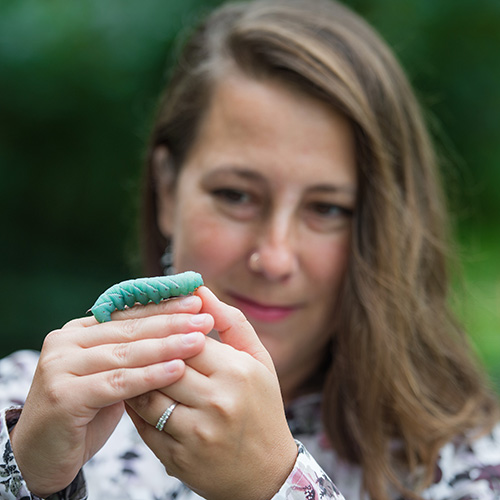Juli Carrillo

About
| Rank | Assistant Professor |
| Program | Applied Biology |
Juli Carrillo’s fascination with bugs began during her childhood in Houston, Texas. “I opened an insect field guide and there were these beautiful pictures of insects in the kind of crazy colours you really only see in a jewelry box,” she said. “I just got very excited about bugs.”
That excitement, combined with her love of nature, eventually led Carrillo to pursue her graduate and PhD degrees in Ecology & Evolutionary Biology at Rice University in Texas. Her postdoctoral research at Purdue University in Indiana focused on how the evolutionary history of plants has changed how plants interact with organisms in the environment, research that she will continue as part of the Centre for Sustainable Food Systems at UBC Farm.
Carrillo uses the tomato plant as a case study. Tomatoes send out a chemical signal when they are being attacked by an herbivorous insects, like the tobacco hornworm.
“Wild tomato plants are really good at crying for help and attracting wasps, which are an enemy of the tobacco hornworm,” she said. “Domesticated tomatoes, on the other hand, perhaps due to cultivation or breeding practices, have become less resistant to insects and have reduced ability to call their wasp bodyguards in.”
Carrillo’s research will help to identify which wild and land race varieties of tomatoes are good at asking for help. Plant breeders can use this information to screen plants for particular traits which can then be bred into domesticated tomato plant to enable them to become more resistant to pests.
Carrillo is also interested in how soil affects a plant’s ability to defend itself against insects. “Soil conditions can influence how well a plant can communicate. Rather than using pesticides, growers can use soil to defend the plant against different types of damage.”
The UBC Farm is the perfect place for Carrillo to conduct this research. “We’ll be using the Farm to look at some of the different ways that soil can improve plant resilience,” she said. “There’s a lot of really interesting work being done at the Farm to try and improve the way food is produced and I’m happy to be part of that.”
Tagged with: